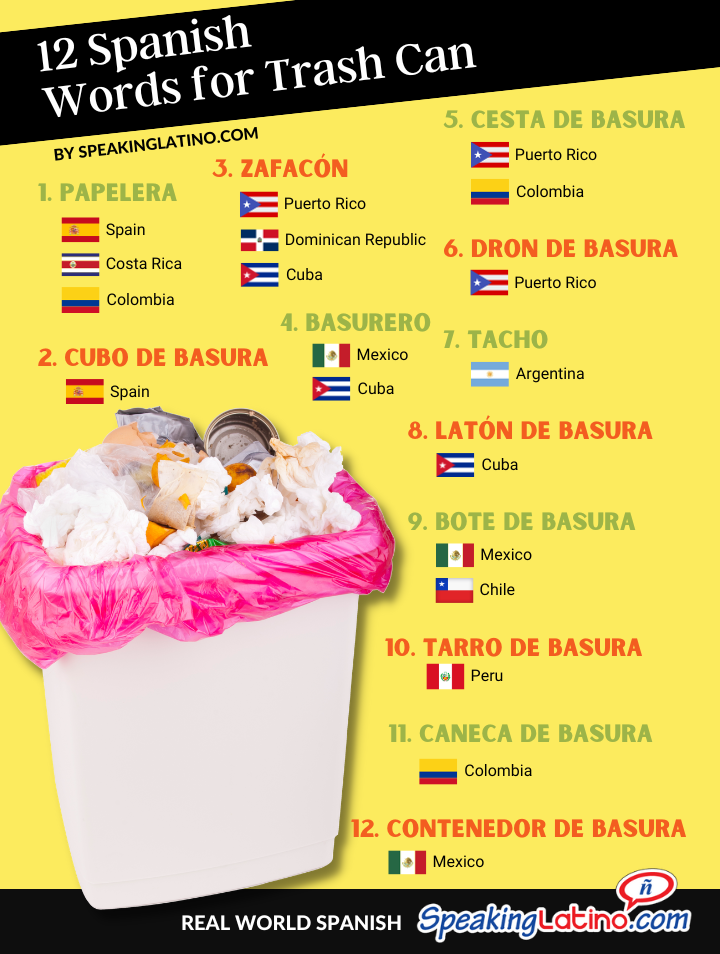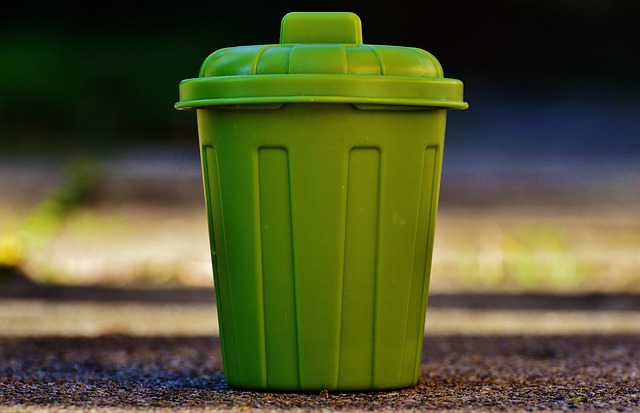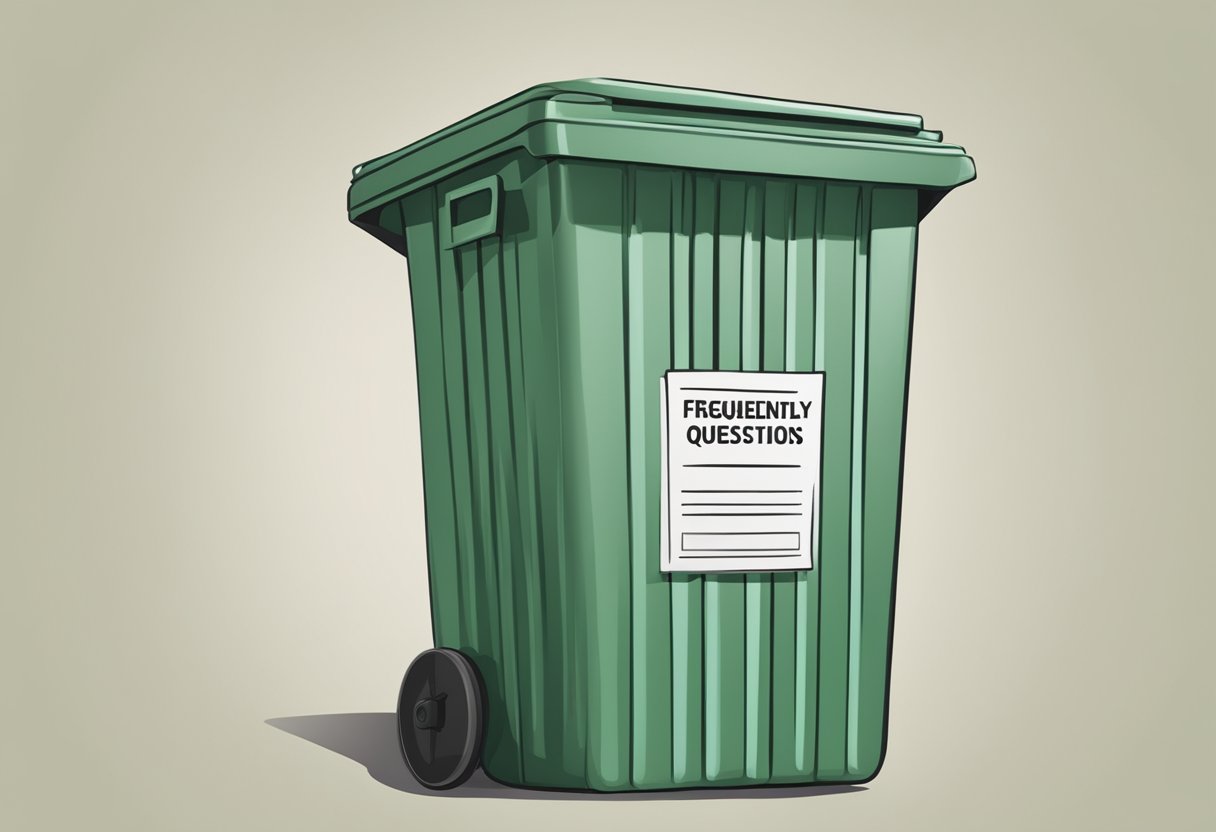
It never ceases to amaze me how many Spanish differences exist for a word and the Spanish word for trash can is no exception. The most common words for trash can are cesto or papelera. You can also say recipiente or contenedor de basura. Here are more Spanish synonyms for trash can.
Spanish for TRASH CAN
1. cesto – México
2. tacho – this word is for Argentina, and perhaps Uruguay. It is also used in Perú.
3. zafacón – you will only ever here this from a Puerto Rican, Cuban or a Dominican. Learn more about the origin of the word zafacón here.
4. basurero – this is the most common word of the group and will be recognized in almost every country
5. papelera – Spain, Costa Rica and Colombia
6. caneca (de basura) – Colombia
7. cubo de basura – Spain
8. cesta de basura – Puerto Rico and Colombia
9. dron de basura – Puerto Rico
10. latón de basura – Cuba
11. bote de basura – Mexico and Chile
12. tarro de basura – Peru
13. contenedor de basura – Mexico
Trash and Trashcan related vocabulary in Spanish
In learning Spanish, it’s essential to know the vocabulary related to waste disposal, as it is a part of daily life and conversation. This section provides a list of common terms and highlights regional variations.
Common Waste-Related Terms
| English | Spanish |
|---|---|
| Trash can | Cubo de basura |
| Garbage | Basura |
| Waste | Desechos |
| Recycling | Reciclaje |
| Organic waste | Residuos orgánicos |
| Landfill | Vertedero |
| Waste bin | Contenedor de basura |
| Dumpster | Contenedor de desechos |
| Plastic | Plástico |
| Glass | Vidrio |
| Paper | Papel |
| Metal | Metal |

Conversational Phrases About Trash and Waste
In everyday dialogue, one may need to refer to a trashcan for various reasons. Here are some expressions where the Spanish word for trashcan — “basurero” or “papelera” for a smaller wastebasket — is commonly used:
- Could you throw this away?
- ¿Puedes tirar esto al basurero?
- Where is the trashcan?
- ¿Dónde está el basurero?
The word “basurero” typically refers to a larger trashcan used for general waste, while “papelera” is used for a small bin intended for paper waste.
Environmental Waste Discussions
In the context of environmental conservation, discussing proper waste disposal and trashcan usage is important. Key phrases include:
- Please use the trashcan for recycling.
- Por favor, use el basurero de reciclaje.
- Do not litter; use the trashcan.
- No tires basura; usa el basurero.
What’s the Best Translation for a Trash Can in Spanish?
The other day we received the following question about the Puerto Rican Spanish word zafacón and whether or not to use it:
“My husband, a native of PR, and I are having a discussion about the best way to translate the term “garbage/trash can” for a trash collection company whose Spanish speaking customers are 90% Puerto Rican.
We agree that “zafacón” is not ideal as it would confuse any non-PR Spanish speakers who live in the service area of this company. I like “basurero” because it is short and I agree it would be almost universal. My husband says “basurero” would give the impression of a landfill but I feel that the context would clearly refer to a garbage can. (In other areas of the document, I use “vertedero” for landfill).
I say “balde de basura” is a good term that won’t confuse most people but he says for Puerto Ricans a “balde” always is a pail, though I swear I never heard him ever use it like that in 44 yrs of marriage. I also have never heard any of the people who I have lived among for many years use balde specifically for pail, though I have to admit I have rarely heard anyone use it at all.”
This was an interesting question and here is my reply:
“I am a native Puerto Rican too currently living in Miami where you know there is a huge Hispanic population. I have to admit that I am very conscious of not using zafacón among my Hispanic friends because I know they won’t understand me. Even with my kids, I don’t use that word (zafacón) at all because I don’t want them to use it at school and no one understand them. Later on, when they are a little bit older, I will introduce those specific words to them.
What I am using with my kids instead of “zafacón” is simply “basura”. ¿Dónde está la basura? ¿Échalo en la basura?
I think that “basurero” will be a good option to use for a trash can. Another term you can use is “recipiente de basura” but it is a longer option and also sounds more formal to us.
So for us Puerto Ricans…zafacón = trash canbasurero = vertedero = landfillblade = cubo = pail”

Common doubts and questions about Spanish trashcan vocabulary
This section provides clear translations and explanations for common terms related to trash receptacles in Spanish, which will be useful for both language learners and travelers.
What do you call a trashcan in Spanish?
In Spanish, a trashcan is typically referred to as “papelera” when used for paper waste or “basurero” for general waste.
How do you say ‘rubbish bin’ in Spanish?
The term ‘rubbish bin’ translates to “cubo de basura” in Spanish, commonly used in Spain and Latin America.
What is the translation for ‘waste container’ in Spanish?
“Waste container” is translated into Spanish as “contenedor de residuos.”
What does ‘cubo de basura’ mean in English?
“Cubo de basura” is a Spanish term that means “garbage bin” or “trash bin” in English.
What is the equivalent of a dumpster in Spanish terminology?
A dumpster in Spanish is commonly called a “contenedor de basura” or simply “contenedor.”
How do you refer to a recycling bin in Spanish?
In Spanish, a recycling bin is often called “contenedor de reciclaje” or “papelera de reciclaje.”
Photo credit: La riqueza del castellano by MikiAnn via flickr